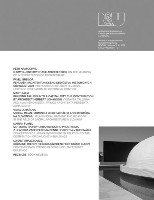O smyslu interpretace architektury
On the Meaning of Interpretation of Architecture
Author(s): Petr KratochvílSubject(s): Cultural Essay, Political Essay, Societal Essay
Published by: Historický ústav SAV, v. v. i.
Keywords: Architecture; interpretation; meaning; phenomenology
Summary/Abstract: Any attempt to interpret architecture, its history and current works must be based on some theory. There are many different approaches to this interpretation that can be categorized according to the ‘genres’ of writing in which they are applied, or according to the frames of reference pointing at the different aspects of architectural work, or, finally, according to the philosophical background of the particular architectural theory. The author describes in detail the theoretical approaches of Vittorio Lampugnani, Wayne Attoe, Christian Norberg-Schulz, Charles Jencks and the representative figures of structuralism. He considers Heidegger´s fundamental ontology and hermeneutics as the most fruitful of the philosophical impulses stemming from the phenomenology. From this point of view the primary interpretation consists in architectural work itself because it reveals human experience of the world incorporated in its shape and meaning. The theoretical interpretation must then question the world that architecture offers to us. This issue is rather broad and should be structured. First of all, we must try to grasp the most actual problems of our time as they are manifested in our built environment: our relation to nature, conflict between private and public sphere, coexistence of new and old architecture, and presence or absence of values unifying our world. In this way the interpretation of architecture can initiate and support discussions on our human world.
Journal: Architektúra & Urbanizmus
- Issue Year: 43/2009
- Issue No: 1-2
- Page Range: 2-9
- Page Count: 8
- Language: Czech

